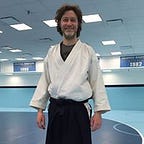The Day Rabin Was Assassinated
Paul Benney — State Portrait for Israel (Supreme Court of Israel), 1994, photo credits — artist.
Twenty years ago today I lived in Jerusalem, studied photography at Bezalel and worked as a security guard in Jerusalem’s fuel tanks depot station. I usually worked two or three shifts a week and rode my bicycle to work from the other side of town. On my ride to work I’d pass a main junction that lead to the Israeli parliament building, the Knesset. On the road there was sprayed graffiti, white on black tar — ”Rabin = Terrorist and a traitor” and “Rabin Must Go”.
I remember how uncomfortable I was riding over those markings as if I, with my slower means of transportation, was the only person who noticed them. These were not good days in Jerusalem. Bus bombings occurred on a frequent basis and the right-wing party had rallies taking place in the center of town calling for the end to the Oslo Accord and the peace process. People in those rallies held signs with a photographs of Rabin dressed as Yaser Arafat or dressed as an SS officer. Bibi Netanyahu — the leader of the Likud party then, surely saw the signs when he spoke from the balcony at the center of town, but there were no condemnations, no calming words spoken.
The environment was charged and contentious, chaotic and angry, with seemingly no diffusion or solution in sight. On November 4th, 1995 I was working a night-shift at the gas depot. A couple of other guys and I were talking and listening to the radio which was covering the huge peace rally happening in Tel Aviv. I don’t remember exactly what happened but they announced that Rabin was shot when he left the rally and all of us were glued to the radio while frantically trying to call friends in Tel Aviv. Shortly after that came the official announcement that Rabin was assassinated and had died on the way to the hospital. Rabin didn’t want to wear a bullet proof vest. My coworkers and I were stunned. I think that none of us slept that night, we just sat together, discussing the vitriol and political anger in Israel that had just culminated in a single act of murder by a Jewish fanatic. I remember feeling this was an end of an era, that Israel as a country would not be the same. Not just because a Jewish person murdered the Jewish prime minister — I never thought that was an unimaginable act. More because it surfaced a full and hard divide between a secular society that wanted to achieve a peaceful coexistence with Palestinians, and the right-wing factions and religious groups hellbent on living in a “Jewish State” fueled by a messianic dream of biblical times.
Around 5am we opened the depot to fuel trucks that came to fill up and then departed to distribute fuel in gas stations around Jerusalem. One person usually checked underneath the truck for any suspicious items below the chassis and one person checked the truck from above. We usually greeted the drivers with “boker tov”, or good morning, but that morning as the drivers said their boker tovs to us all I could muster saying was “shalom”, or peace.
In 1993, two years before Rabin was assassinated I met him briefly. I was working as a photography assistant for the British painter, Paul Benney. Paul was commissioned to paint a portrait of leaders in Israel gathered around a model of the newly-built Supreme Court building. I answered a call to help as a photographer because the final painting was to include a dozen figures, each of whom Paul would need photographed individually and then he would assemble all the images into a single, large painting to be hung in the new Supreme Court building. One afternoon came our session to photograph Rabin on location at the building. Paul and I were setting up our equipment when Rabin entered the room. I remember shaking his hand and being surprised at how soft and gentle it was. At the time I thought it was odd that Rabin, the long-time military man, had such a faint handshake, but over time I learned to appreciate it. I saw the handshake as a symbol of his new appeal — the softer, gentler side of a general who wanted to bring peace to Israel. He didn’t need to prove his strength with an overly strong handshake, he could just be himself.
Twenty years ago Rabin was assassinated. I think my heart broke then with the realization that Israel had changed and for the worst. Twenty years later my heart is still not mended.
